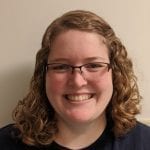Erin Scanlon joins our Department in fall 2020 as Assistant Professor in Residence at the Avery Point Campus. Erin comes to UConn with an impressive track record of university teaching experience and scholarship in physics education research (PER).
After earning a master’s degree in physics from Georgia Institute of Technology, Erin joined the faculty at Texas Lutheran University from 2012-2017 where she developed and taught introductory physics courses and the associated labs. In parallel to that, Erin pursued PhD in the developmental education doctoral program at the Texas State University, the only program of its kind in the nation, where she earned her PhD in 2017 receiving the 2018 Texas State University Outstanding Dissertation Award. Subsequently Erin accepted a position as a preeminent postdoctoral scholar at University of Central Florida in the group of Dr. Jackie Chini. Erin is a renowned expert in the field of physics education research. Her research, supported by intra- and extra-mural grants, was published in the top PER and STEM education journals. Recently Erin’s research focused on two main streams: investigating how studio physics is implemented across multiple institutions in the nation, and investigating how to support people with disabilities in STEM fields.
Erin is one of the founding steering committee members of the APS Inclusion, Diversity, and Equity Alliance (APS-IDEA) launched by APS in summer 2020. This new APS initiative is a world-wide alliance to support departments, national labs and other institutions to identify and enact strategies for improving equity, diversity and inclusion which is much needed in physics. APS-IDEA is a great success with currently more than 90 admitted teams including UConn, see the article on APS-IDEA (to avoid conflict of interest our application was not reviewed by Erin). Erin is also the vice chair of the Physics Education Research Leadership and Organizing Council (PERLOC) which is the leadership body for the physics education research community and founded the Conference Accessibility Working Group.
Erin is committed to outreach and initiated at the Texas Lutheran University highly successful outreach events, called Family Physics Night, which brought together members from the university and local community members. Once settled in, Erin is looking forward to start similar outreach and research activities. Erin moved to Connecticut with her husband Matt who is also a scholar in PER and teaches physics at post-secondary level. We are excited to welcome Erin as a physics faculty in our department, and look forward to working with her.
